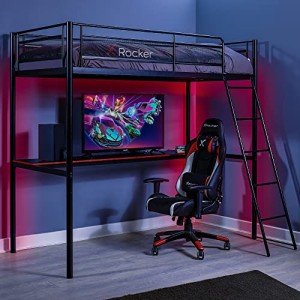Why Do So Many People Are Attracted To Kids Bunk Bed?
The Ultimate Guide to Kids Bunk Beds: Maximizing Space and Fun
With the rise of vertical living and smaller sized areas, the popularity of bunk beds has soared among households. Bunk beds not only provide a useful sleeping option, especially in shared rooms, but they also bring a component of enjoyable into a kid's life. This comprehensive guide looks into the functions, advantages, and considerations of kids' bunk beds, making it easier for moms and dads to choose the ideal bed for their youngsters.
Functions of Kids Bunk Beds
Bunk beds are versatile furniture pieces that serve more than a single function. Here are some key features to consider:
Feature
Description
Material
Bunk beds can be built from wood, metal, or a combination of both, providing varying levels of toughness and style choices.
Safety Features
A lot of bunk beds come equipped with guardrails, secure ladders, and capped assistances for safety, especially essential for kids.
Style Variety
Options vary from timeless styles to modern designs, guaranteeing a match for any space design.
Space-Efficiency
Bunk beds utilize vertical space, making them ideal for smaller sized rooms.
Convertible Options
Some designs can be transformed into two different beds, offering versatility as children grow.
Storage Solutions
Some bunk beds feature integrated storage drawers or shelves, helping to keep the room organized.
Benefits of Kids Bunk Beds
Purchasing a bunk bed comes with several advantages:
- Space Saving: Bunk beds make the most of flooring space, enabling more backyard or storage solutions.
- Fun Factor: With a bunk bed, kids have a location that promotes imagination and companionship during slumber parties or playdates.
- Cost-Effective: Instead of buying 2 separate beds, a bunk bed can accommodate two children simultaneously, saving money in the long run.
- Flexibility: Many bunk beds can be taken apart or converted into twin beds, making them a long-term financial investment as kids's requirements alter.
- Social Interaction: Bunk beds encourage family bonding and friendships, offering an inviting space for kids to share stories and laughter.
Factors to consider When Choosing a Kids Bunk Bed
When selecting the perfect bunk bed for a kid, parents ought to take into account different factors:
- Safety Standards: Ensure that the bunk bed abide by safety regulations and includes necessary safety features.
- Age Appropriateness: Different designs cater to various age groups. For instance, traditional bunk beds might not appropriate for younger kids.
- Room Dimensions: Measure the bedroom to make sure the bunk bed fits appropriately, permitting for space to move easily.
- Weight Capacity: Consider the weight load of each bed and guarantee it accommodates the kid's weight comfortably.
- Design Preferences: Letting children take part in the selection procedure can assist them feel more excited about their new bed.
Kinds Of Kids Bunk Beds
Bunk beds come in various styles and setups to suit different needs:
Type
Description
Requirement Bunk Bed
A traditional style with one bed stacked on top of another, usually using a ladder to access the top bunk.
L-Shaped Bunk Bed
Functions two bunk beds connected in an L-shape, typically more spacious and ideal for kids sharing a space however needing a bit more space.
Triple Bunk Bed
Consists of 3 stacked beds, suitable for maximizing sleeping arrangements in extremely limited areas.
Loft Bed
A raised bed with space underneath that can act as a backyard, study corner, or additional storage.
Futon Bunk Bed
Combines a bunk bed on leading with a futon or sofa underneath, making it great for sleepovers and optimizing room usage.
Convertible Bunk Bed
Can be separated into 2 specific beds, using flexibility as kids's needs alter.
Caring for Kids Bunk Beds
Keeping bunk beds is important for making sure longevity and safety. Here are some basic care practices:
- Regular Inspections: Check the bed routinely for loose screws and tightened up bolts to ensure stability.
- Cleanliness: Keep bed linen clean and fresh, turning bed mattress for even wear.
- Guardrails: Ensure guardrails are safe and secure and in location, particularly if kids tend to move around a lot in their sleep.
- Air Circulation: Ensure the bed has sufficient airflow, avoiding wetness buildup that can cause mold or mildew.
FAQs About Kids Bunk Beds
Q1: At what age can a child securely utilize a bunk bed?
A1: Generally, children aged six and older are thought about safe to utilize the upper bunk due to the height and stability aspects involved.
Q2: Can I put a bunk bed near a window?
A2: It is advisable to avoid positioning a bunk bed near windows to decrease the risk of falling or injuries.
Q3: Are bunk beds safe for younger kids?
A3: While some contemporary bunk beds include security functions accommodating more youthful children, it is generally suggested to wait up until they are older, typically over 6 years.
Q4: What is the common weight limit for top bunks?
A4: Weight limitations differ by design however typically vary from 150 to 250 pounds. Constantly refer to gavinarcher.top .
Q5: How frequently should I inspect the bunk bed's security functions?
A5: It is recommended to perform a security check every couple of months or whenever you notice any indications of wear.
Kids' bunk beds serve as a tactical option for households seeking to take full advantage of space while supplying a fun and engaging sleeping environment for their children. With a variety of choices offered— from standard styles to loft beds— parents have the freedom to select something that meets their household's specific requirements. By considering crucial elements such as security, space viability, and their kids's choices, parents can make an educated option, guaranteeing that each kid is delighted about bedtime while benefiting from a well-organized space.
